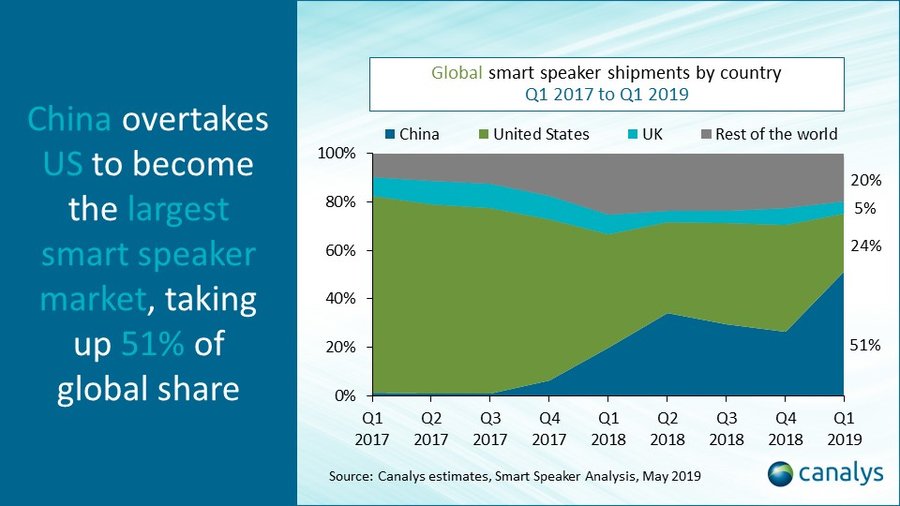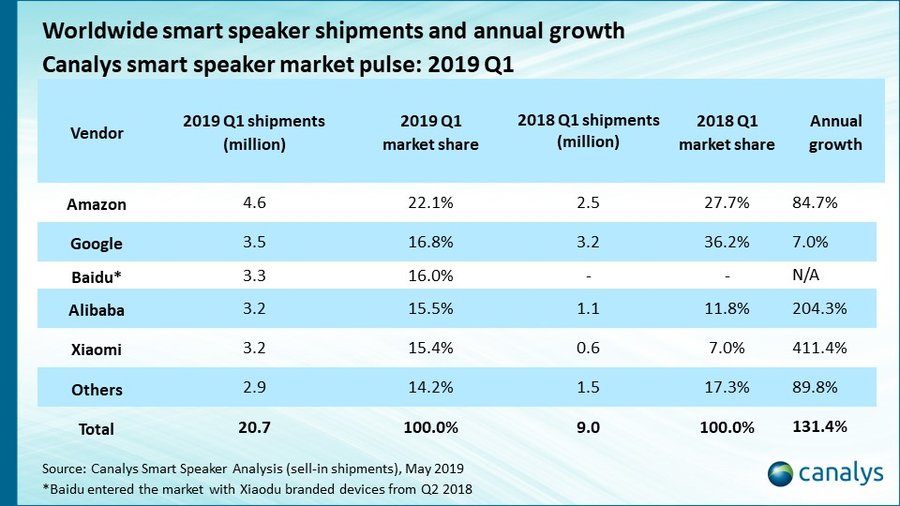Palo Alto, Shanghai, Singapore and Reading (UK) – Monday, 20 May 2019
Smart speaker market share data from Canalys shows China reached 10.6 million units by growing nearly 500% year-on-year in Q1 2019.Driven by festive promotions, smart speaker sell-in shipments in China bucked the global seasonality trend by growing 23% sequentially. This made China the largest smart speaker market, overtaking the US where 5.0 million smart speaker units were shipped during the quarter. The global smart speaker market has reached 20.7 million units, returning to triple digit growth of 131%. China alone takes up 51% of global smart speaker shipments, with US dropping to 24% in Q1 2019 from 4** **4% of Q4 2018.
The competitive landscape inside China has shifted significantly. Baidu topped the market for the first time. Baidu had a stellar quarter building up from Q4 last year and the amount of marketing promotion around its smart speakers was unprecedented. The company struck an exclusive sponsorship deal with CCTV, the national TV channel, on its New Year’s Gala on Chinese New Year’s Eve, which is the biggest entertainment show in terms of viewer numbers in China. This sponsorship allowed Baidu to generate significant downloads of its mobile app, which distributes over 100 million coupons to a 1.2 billion audience during the show, and to drive country-wide awareness around its smart speakers.
“The lightning fast development in China is largely driven by vendors pouring in large amount of capital to achieve dominant share quickly. This strategy is favoured by internet service providers like Baidu, Alibaba and Tencent who are used to spending billions on traffic acquisition and know how to reach critical installed base fast,” said Nicole Peng, VP of Mobility at Canalys.
Alibaba and Xiaomi maintained growth after a strong Q4, by promoting gift sales around Chinese New Year. “Throughout this year we expect Alibaba and Baidu will continue to spend in exchange for more users, given that scaling-up has become their top priority over monetization. It is great for mass market education and fast consumer adoption, as consumers are paying very little for a device and the countless content and services,” continued Peng.
Global vendors including Amazon, Google and others, are focusing on enhancing interactions with smart assistants across different forms of speaker devices, especially with the help of third-party developers. “Multimodal user interaction is the theme this year. Smart assistants in smart speakers are gaining more capabilities via additional components such as displays, cameras and sensors. However, skills and actions are there to enhance assistants’ abilities to operate and to provide value to users,” said Canalys Senior Analyst Jason Low. “First party smart assistant features such as Google Duplex is attention-grabbing. Yet, the smart assistant ecosystem will only be boundless with the help of the extended developer community.”
Canalys defines a smart speaker as a stand-alone speaker designed to interface first- and third-party content, applications and skills through a cloud-based voice assistant, over a wired or wireless network.
Email Newsletters
Sign up to receive TelecomTV's top news and videos, plus exclusive subscriber-only content direct to your inbox.





